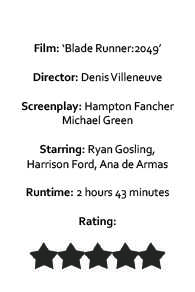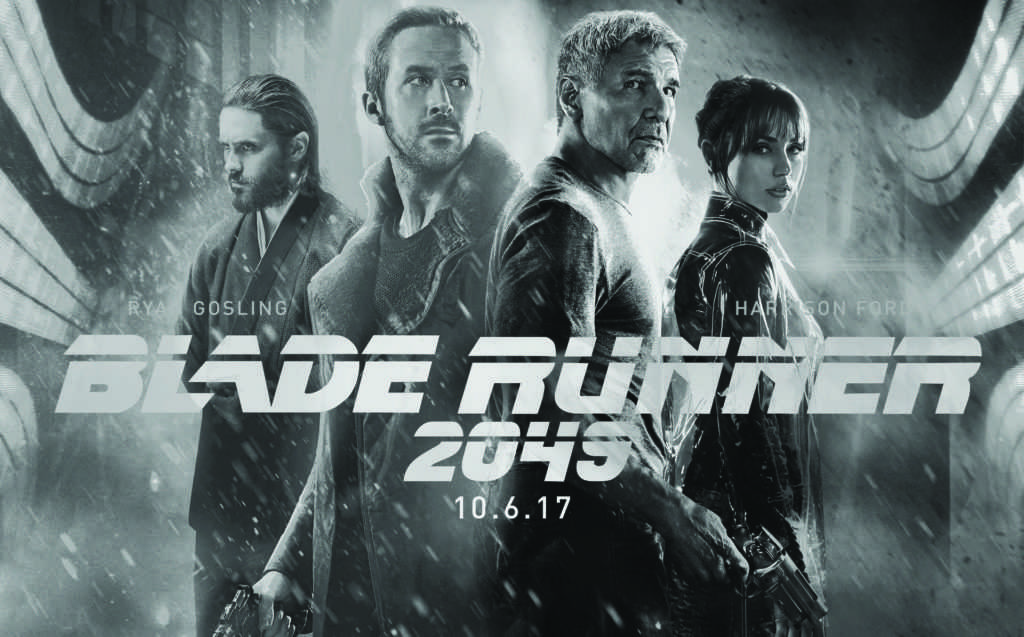The release of Ridley Scott’s ambitious future noir thriller, “Blade Runner” in 1982 saw mixed reviews and less-than-desirable box office numbers. At the time of its release, it was criticized for being too slow, dark and boring. However, as the years went on, it developed a passionate cult following that garnered its “masterpiece” status in many circles for its imaginative production design and groundbreaking commentary on what it means to be human.
 The influence that “Blade Runner” has had on the world of sci-fi cinema is hard to refute, and now, 35 years later, the film world is blessed with a follow-up to the saga of the replicant plight, and it might be even more revolutionary than its predecessor.
The influence that “Blade Runner” has had on the world of sci-fi cinema is hard to refute, and now, 35 years later, the film world is blessed with a follow-up to the saga of the replicant plight, and it might be even more revolutionary than its predecessor.
“Blade Runner 2049” stars Ryan Gosling, Harrison Ford, Ana de Armas, Sylvia Hoeks and Jared Leto, and is directed by popular French-Canadian auteur Denis Villeneuve. Warner Bros. has worked tirelessly to keep the plot of “2049” a secret and I can’t help but respect that, especially in a time when audiences seem to ferret over plots before their films are released. In this film, set 30 years after the original, Gosling plays a replicant detective known only as “K,” who is tasked with uncovering a colossal conspiracy surrounding the nature of relations between replicants and humans.
But it isn’t just a grand-scale detective mystery; K’s journey evolves into an intimate odyssey of self-discovery. It’s an odyssey that leads him not only into the deserted outskirts of the grossly overpopulated dystopian Los Angeles, but also into the outskirts of his own artificial psyche.
K is one of the best protagonists that a mainstream Hollywood film has had to offer in recent memory; his arc as an artificial being who is frightened by the concept that he might be a real boy is unlike anything cinema has offered. While he might have a cold and stoic outer shell, it is his timid longing for a sole purpose in life that makes him so easy for the audience to empathize with.
This film is the latest in a long line of belated Hollywood sequels, a trend that seems to fail more than it succeeds. Whether it be “Jurassic World,” “Tron: Legacy” or “Zoolander 2,” it is apparent that filmmakers have difficulty expanding upon classic films in their follow-ups. Instead, they settle for recycled plotlines and cheap fan service. Thankfully,
Villeneuve and company take the time to slowly and surely expand off of what Scott built in the original.
The film maintains the essence and soul of the original while still being its own singular vision, adding complexities to the lore. This films continues to explore what it means to be alive as society outpaces itself in new, profound and unexpected ways.
It’s rare to see a film live up to the promise of being a worthy sequel to a game changer classic that precedes it quite like “Blade Runner 2049” does, and thanks to the cinematic flare from Villeneuve and the legendary cinematographer Roger Deakins, it feels entirely fresh and potentially even more game changing considering the current state of mainstream Hollywood filmmaking.
This film doesn’t just break the barriers of modern mainstream filmmaking, it obliterates them. To put it simply, it is masterpiece, and I have confidence that 30 years down the line this will be viewed as one of the most important films of this decade. This is truly unlike anything audiences have experienced in the past decade, and it demands every bit of
attention it can get.

























